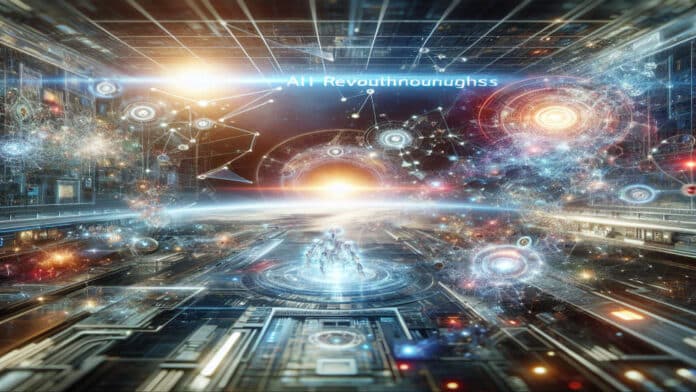Table of Contents
The AI Revolution rapidly transforms how we live, work, and interact with technology. Artificial Intelligence can learn from data, adapt to new inputs, and perform tasks that previously required human intelligence. As machines become more advanced, they change how industries operate and revolutionize various aspects of our daily lives. It is essential to understand the impact of this AI–revolution and how it will continue to shape the world.
Main Points of AI Revolution
- The evolution of Artificial Intelligence technology
- The impact on industries and employment
- The ethical implications of the AI revolution
- The future potential of AI technologies

The Dawn of Cognitive Computing: How AI is Shaping the Future
Cognitive computing, a branch of artificial intelligence (AI), is revolutionizing how we interact with technology. Cognitive computing is paving the way for innovative advancements across various industries by mimicking the human brain’s ability to understand and reason. From healthcare to finance, AI’s impact is shaping the future in unprecedented ways.
Critical aspects of cognitive computing include:
- Natural language processing: AI’s ability to understand and respond to human language transforms customer service and communication.
- Machine learning: AI systems can improve performance and efficiency by analyzing data and recognizing patterns.
- Decision-making support: AI can assist professionals in making complex decisions by providing valuable insights and recommendations.
As we embrace the dawn of cognitive computing, it’s evident that AI will continue to shape the future in ways we can only imagine.
Machine Learning and Ethical Considerations: Steering the AI Revolution Responsibly
As machine learning continues to revolutionize various industries, it is crucial to consider the ethical implications of this technology. Transparency, accountability, and fairness are essential when developing and implementing AI systems to ensure they do not perpetuate bias or harm individuals. It is imperative for organizations and governments to
The Ethical Considerations of Machine Learning
| Ethical Consideration | Description |
|---|---|
| Transparency | AI systems should provide clear, understandable explanations for their decisions and actions. |
| Accountability | Developers and organizations must take responsibility for the outcomes and impact of their AI systems. |
| Fairness | AI systems should be designed and implemented in a way that is fair and equitable for all individuals. |
Integration of AI in Everyday Life: From Smart Homes to Autonomous Vehicles
Integrating Artificial Intelligence (AI) into everyday life has become increasingly prevalent in recent years. From smart homes that can adjust the temperature and lighting based on our preferences to autonomous vehicles that can navigate traffic and make decisions independently, AI is revolutionizing how we live and interact with technology. This widespread integration of AI has the potential to make our lives more convenient, efficient, and safer.
The Evolution of Work: AI-Driven Automation and the New Labor Landscape
The work landscape has significantly transformed in recent years due to the widespread adoption of AI-driven automation. This evolution has increased efficiency, productivity, and innovation in various industries.
The Impact on Labor
Automation continues to reshape the labor landscape, shifting the demand toward workers with advanced technical and analytical skills as routine and repetitive jobs become increasingly automated.
The Future of Work
Focus on AI’s impact: As AI-driven automation continues to advance, it will play a pivotal role in shaping the future of work. Organizations must adapt by investing in the retraining and upskilling of their workforce to remain competitive in this increasingly automated landscape.
AI and Global Society: Navigating the Complexities of Cross-Cultural Machine Intelligence
As artificial intelligence (AI) advances, its impact on global society becomes increasingly significant. The complexities of cross-cultural machine intelligence present unique challenges and opportunities for communities worldwide. With diversity and inclusivity at the forefront, navigating AI’s ethical, social, and technological implications requires a collaborative and interdisciplinary approach. This article explores the intersection of AI and global society, shedding light on the need for thoughtful consideration and proactive engagement in shaping a responsible AI future.



